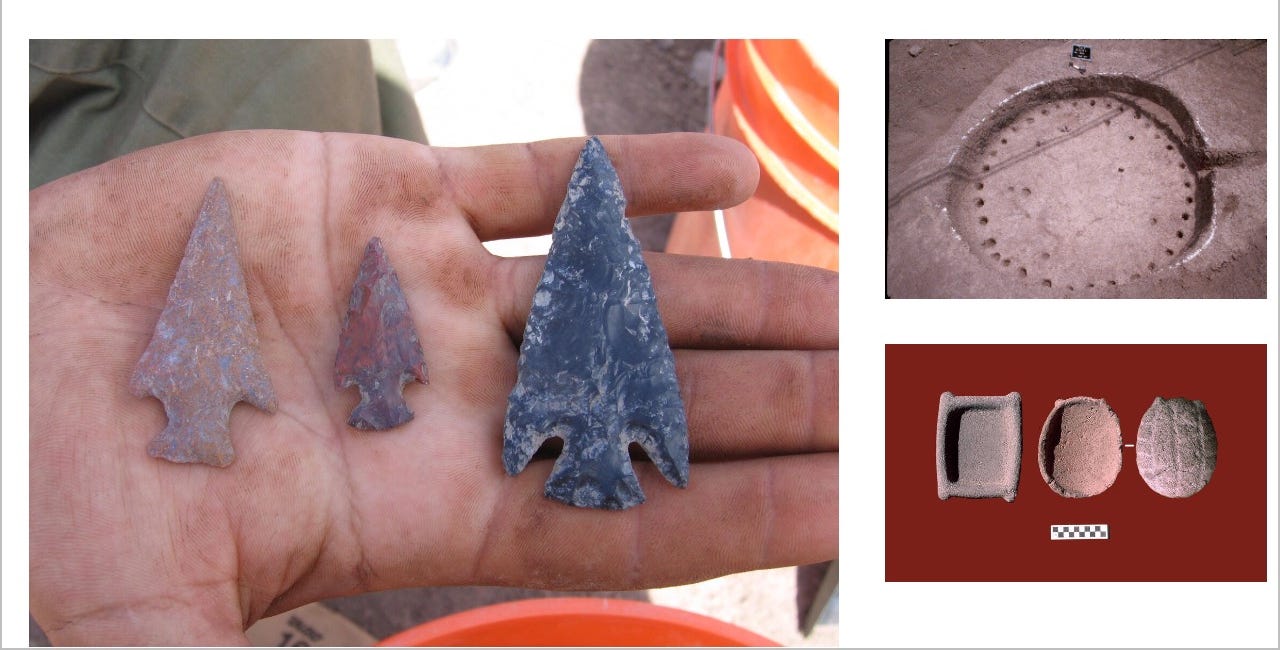🌡️ Tucson's December Heat Hits 80°: Tim Thomure Discusses Climate, Politics, and Environmental Justice
In a heated discussion, Tucson city leaders address unprecedented winter temperatures, a proposed sales tax increase, and the urgent challenge of PFAS contamination.
Based on the 12/20/24 Buckmaster show on KVOI-1030AM.
🙊 Notable quotes from the show
Tim Thomure on Sales Tax Increase: "Both fascinating and frightening." This reflects the mixed feelings about financial strategies to support municipal needs.
Tim Thomure on PFAS Contamination: "This problem in Tucson is going to be in hundreds of millions of dollars and it's going to be in the decades to fix." This quote underscores the scale of the environmental crisis facing the city.
Dylan Smith on Senator Wadsack’s Excuse: "If you go faster, you use more energy more quickly. That's not how the laws of physics work." This quote critiques the absurd rationale given by the senator for speeding.
Tim Thomure on Government Relationships: "We're like cousins in the family; we love each other, and we generally get along. Then, we have moments where somebody's annoying the other one." This metaphor illustrates the complex dynamics of local governance.
😽 Keepin’ It Simple Summary for Younger Readers
👧🏾✊🏾👦🏾
On December 20, 2024, Tucson was really hot for winter, almost reaching 80 degrees, which made people think about climate change. The city's managers talked about raising taxes to help fix important things but also discussed a big problem with dangerous chemicals in the water. They explored how the city and county work together in government, sometimes agreeing but often having problems. There was even a funny story about a senator getting in trouble for speeding, which showed how some rules don’t seem fair for everyone.
🗝️ Takeaways
🌡️ Record Temperatures: December 20th marked an unprecedented hot day in Tucson, raising alarms about climate change.
🏛️ Tax Proposition: Tucson's proposed sales tax hike could generate $800 million but raises questions about civic transparency.
💧 Environmental Concerns: The city's struggle with PFAS contamination highlights a decades-long oversight causing severe public health risks.
🔄 Governmental Relations: Tucson's city and county governments' dynamics are complex, featuring collaboration and tension.
🚔 Political Accountability: A local senator’s speeding ticket exemplifies the broader issues of privilege and accountability in politics.
On a scorching December 20th, 2024, with temperatures threatening to breach 80 degrees in Tucson - a stark reminder of our climate-changed reality - Bill Buckmaster hosted another edition of his long-running radio show on KVOI.
The episode highlighted two key local figures: Tim Thomure, Tucson's City Manager adept at managing municipal challenges, and Dylan Smith, the insightful editor and publisher of TucsonSentinel.com.
Against the backdrop of record-breaking winter heat that would make climate deniers squirm, the conversation delved into critical local issues that expose the intricate dance of power, money, and survival in late-stage capitalism.
🏛️ Taxation and Transformation: The Municipal Mirage of Progress
In a municipal masterpiece of performative problem-solving, Tucson is preparing to ask voters to approve a sales tax increase that could generate a whopping $800 million over a decade.
City Manager Tim Thomure openly referred to the measure as "both fascinating and frightening"—a phrase that succinctly captures municipal governance today amid deteriorating infrastructure and corporate apathy.
The proposed increase would push the sales tax to 9.2%, a number that sounds more like a scientific constant than a tax rate. Thomure broke down the vision with bureaucratic poetry:
"We're putting investment in the long-term sustainability of our housing-first program, community safety, health and wellness programs, and additional resources to combat the opioid and fentanyl public health crisis."
But let's excavate the dirt beneath this smooth-talking veneer.
This is the same Tim Thomure who oversaw municipal projects that bulldozed 10,000-year-old Hohokam and Tohono O'odham gardens along the Santa Cruz River—sacred lands representing the Southwest's oldest agricultural sites.
While he speaks of community investment, his actions reveal a different narrative. Indigenous archaeologists have documented how his administration cavalierly moved earth potentially containing ancestral remains, dumping excavated material onto Tohono O'odham land without consultation.
San Xavier District chairman Austin Nunez perfectly summed up the betrayal: "We were totally unaware of the situation until after the fact."
So forgive me if I don't pop champagne over Thomure's latest municipal "miracle."
💧 PFAS: Toxic Bureaucracy and Environmental Gaslighting
In a searing examination of environmental violence, the discussion exposed the ongoing PFAS (forever chemicals) contamination in Tucson's groundwater—a toxic testament to the military-industrial complex's carelessness.
Thomure disclosed that the city has invested an astonishing $70 million in securing safe drinking water, while the anticipated cleanup expenses could soar into the hundreds of millions.
"This problem in Tucson is going to be in hundreds of millions of dollars and it's going to be in the decades to fix," Thomure stated bluntly. The city's lawsuit against the U.S. Air Force represents a David-versus-Goliath struggle against systemic environmental racism.
Yet, this sounds suspiciously like performative accountability from the same institutional machinery that allowed these toxins to proliferate for decades.
The most damning revelation? The contamination has already spread miles from its original site, a slow-motion ecological disaster that epitomizes the long-term violence of institutional negligence.
As Thomure noted, PFAS compounds "flow with that groundwater very slowly, but they flow... further and further from the site of contamination" - a metaphor that could describe bureaucratic indifference itself.
🤝 Governmental Dynamics: The Political Pantomime
Dylan Smith and Thomure explored the complex relationship between Tucson's city and county governments, a political dance that would make professional choreographers dizzy. Thomure's metaphor was pure bureaucratic poetry: They're like "cousins in the family that we love each other, and we generally get along, and then we have our moments where somebody's annoying the other one."
This nuanced description reveals the true nature of local governance: fundamentally aligned but perpetually complicated. They collaborate on environmental issues, culture, housing, and public health, with staff even co-located in various departments. Yet tensions simmer, particularly around water rates and regional transportation planning.
But let's be clear: this collaborative facade masks deeper dysfunctions. This is the same governmental structure that authorized construction projects ignoring Indigenous archaeological protections, dumping excavated earth containing potential human remains without proper consultation.
🚔 Political Privilege and Speeding: A Microcosm of Entitlement
In an entertaining snippet of local political drama, Smith narrated the story of Republican state senator Justine Wadsack's speeding ticket - an account that exemplifies political privilege. Her first defense? She claimed to be hurrying home due to a low Tesla battery - a statement Smith joyously deconstructed with scientific accuracy.
"If you go faster, you use more energy more quickly. That's not how the laws of physics work," Smith quipped, exposing the absurdity of her explanation. Ultimately, Wadsack opted for a defensive driving class rather than face trial, transforming what she claimed was "political persecution" into a mundane traffic school resolution.
🌡️ Climate Crisis in Real-Time
The episode's backdrop of near-80-degree temperatures in December wasn't just small talk—it was a terrifying billboard advertising the climate emergency. Breaking temperature records that had stood for over a century, the casual conversation about winter heat became a scathing indictment of our collective environmental denial.
In Tucson, as in many places, the local is profoundly political. Every conversation is a potential spark for systemic change, and every municipal decision is a battleground for social justice. On this scorching December day, hope looked a lot like radical, unflinching accountability.
Tim Thomure represents the quintessential modern municipal leader: articulate, seemingly progressive, yet fundamentally complicit in the very systems he claims to challenge. His polished presentations cannot obscure the bulldozers that continue to crush our most sacred historical landscapes.
The revolution will not be bureaucratized, mi gente. It will be lived, fought, and won in the streets, in the sacred lands, and in the relentless pursuit of true justice.
🌵 Mondays with Morales - Hohokam Ancestors Disturbed: Tucson City Manager's Monumental Mistake🏺
What good is the city of Tucson reading the Land Acknowledgment and then literally desecrating the land that they just dug up and destroyed?








